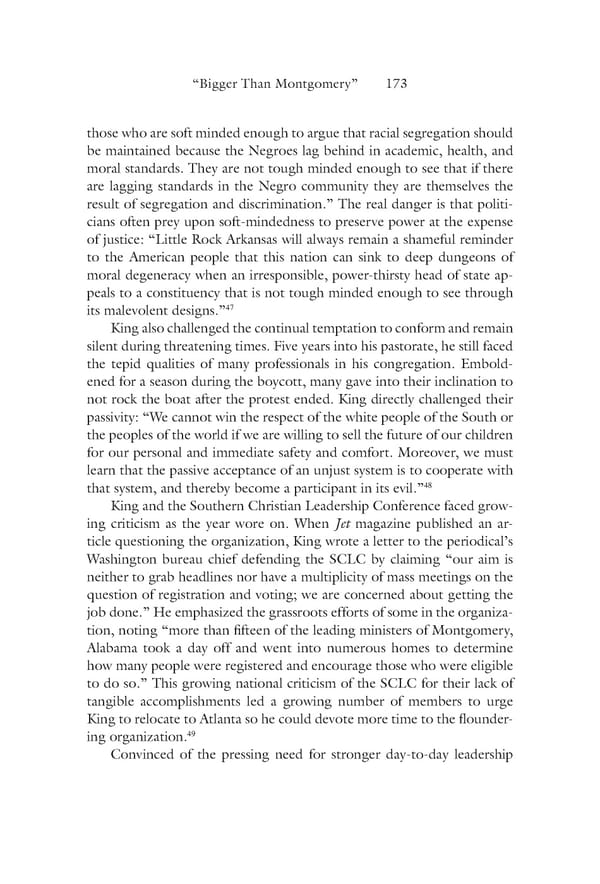“Bigger Than Montgomery” 173 those who are soft minded enough to argue that racial segregation should be maintained because the Negroes lag behind in academic, health, and moral standards. They are not tough minded enough to see that if there are lagging standards in the Negro community they are themselves the result of segregation and discrimination.” The real danger is that politi- cians often prey upon soft-mindedness to preserve power at the expense of justice: “Little Rock Arkansas will always remain a shameful reminder to the American people that this nation can sink to deep dungeons of moral degeneracy when an irresponsible, power-thirsty head of state ap- peals to a constituency that is not tough minded enough to see through 47 its malevolent designs.” King also challenged the continual temptation to conform and remain silent during threatening times. Five years into his pastorate, he still faced the tepid qualities of many professionals in his congregation. Embold- ened for a season during the boycott, many gave into their inclination to not rock the boat after the protest ended. King directly challenged their passivity: “We cannot win the respect of the white people of the South or the peoples of the world if we are willing to sell the future of our children for our personal and immediate safety and comfort. Moreover, we must learn that the passive acceptance of an unjust system is to cooperate with 48 that system, and thereby become a participant in its evil.” King and the Southern Christian Leadership Conference faced grow- ing criticism as the year wore on. When Jet magazine published an ar- ticle questioning the organization, King wrote a letter to the periodical’s Washington bureau chief defending the SCLC by claiming “our aim is neither to grab headlines nor have a multiplicity of mass meetings on the question of registration and voting; we are concerned about getting the job done.” He emphasized the grassroots efforts of some in the organiza- tion, noting “more than fifteen of the leading ministers of Montgomery, Alabama took a day off and went into numerous homes to determine how many people were registered and encourage those who were eligible to do so.” This growing national criticism of the SCLC for their lack of tangible accomplishments led a growing number of members to urge King to relocate to Atlanta so he could devote more time to the flounder- 49 ing organization. Convinced of the pressing need for stronger day-to-day leadership
 Becoming King: Martin Luther King Jr. Page 193 Page 195
Becoming King: Martin Luther King Jr. Page 193 Page 195